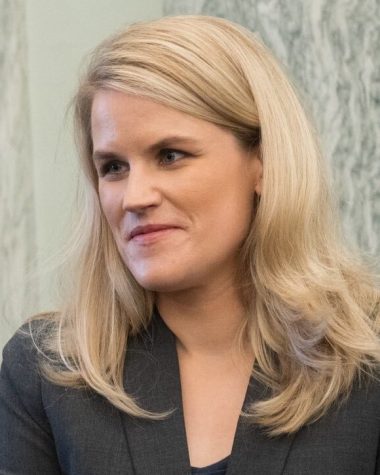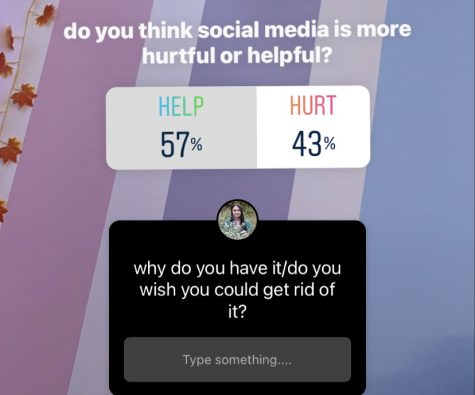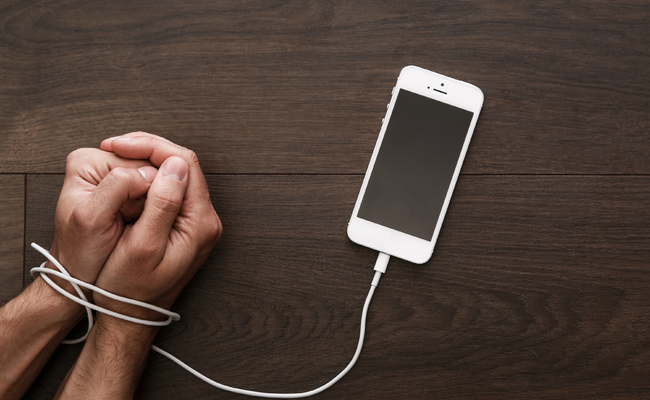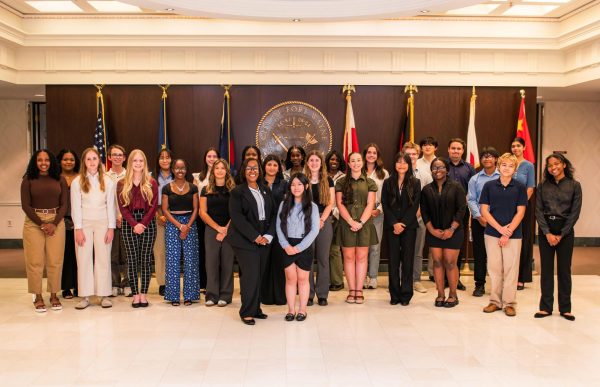Students confront social media amid Facebook scandal
News of the harmful effects of social media is not new, but with the heightened divisions between people and time granting them with more ways to use it, social media has become a deadly weapon.
From promoting body image issues to amplifying misinformation and conspiracy theories, it is entirely possible that the negative impact that social media has on people’s lives outweighs the positive impact.
One platform has found themself in the spotlight recently from reports of them choosing not to fix algorithm issues that they knew were creating problems for their users: Facebook.
An article from the Washington Post analyzed Facebook and what information their algorithm was promoting and striking down.
“A report examined articles shared on Facebook from The New York Times, Buzzfeed, Fox News and a dozen other media outlets and found that the more negative-slanting comments a story drew, the more likely Facebook’s algorithms were to promote it widely,” the article said.
This issue has resulted in news sites abusing the platform, creating a negativity fueled political battleground that is incentivized by clickability and misinformation. Sites that wish to be successful on Facebook are more concerned with getting someone to click on their article than making it truthful, and the more negative comments it can draw, the more successful it will be.
It has been found that social media directly influences people’s mood and outlook on life, so engaging with a platform driven by negativity leads to people having a negative attitude in everyday life and also thoughts on the world and their future.

All of this being brought to light resulted from a Facebook whistleblower, Frances Haugen, who decided that reporting her former employer was necessary from lives being at risk.
“The thing I saw at Facebook over and over again was there were conflicts of interest between what was good for the public and what was good for Facebook,” said Haugen. “And Facebook, over and over again, chose to optimize for its own interests, like making more money.”
This raises the question: Does Facebook or any company have the duty to protect the public and promote what is in their best interest?
Maybe not, but something needs to be done to prevent the negativity on the platform as it is currently inciting violence and breaking trust. Facebook owns and operates Instagram as well, and with a combined total of about 4 billion active users across the two platforms, they have a much bigger influence on society all over the world than most realize.
“When we live in an information environment that is full of angry, hateful polarizing content it erodes our civic trust, it erodes our faith in each other, it erodes our ability to want to care for each other, the version of Facebook that exists today is tearing our societies apart and causing ethnic violence around the world,” said Haugen.
She also spoke of her time working in Civic Integrity at Facebook. She said that their priority was striking down misinformation leading up to election, and as soon as the election was over, Civic Integrity was dissolved. Right afterwards came the insurrection of the capital.
There is no way of saying that getting rid of the Civic Integrity department at Facebook caused the insurrection, but it did prevent misinformation and plots from being struck down, furthering the hate and anger their algorithm would continue to promote, and made no effort to counteract that dangerous energy.
But unfortunately violence and polarization is only one of the issues caused by Facebook. Body image issues of teen girls has also been a major problem.
“What’s super tragic is Facebook’s own research says, as these young women begin to consume this eating disorder content, they get more and more depressed. And it actually makes them use the app more,” said Haugen. “Facebook’s own research says it is not just that Instagram is dangerous for teenagers, that it harms teenagers, it’s that it is distinctly worse than other forms of social media.”
Instagram, which is far more popular among teenagers than Facebook, is leading to higher rates of eating disorders and depression, especially among teenage girls. This had real life consequences increasing thoughts of suicide and leading to lives being lost.
To test how much social media impacts my own life, I challenged myself to go a full week without social media which for me was Instagram along with TikTok, Twitter and Reddit which are other platforms that have presented similar issues.
I also left notifications on for each of the apps to see what they would do with my lack of engagement.
During the first couple days, leaving social media behind was different as it was almost an impulse for me to scroll through it when I was putting off a task. As time went on though, I found that I was directing that energy into something else.
Instead of going on social media, I was spending more time on Netflix, reading news articles, etc. I didn’t leave media behind to do something else, I was simply directing it into a different sector. But despite this, I still found that I was going on my phone less often and what I was watching/reading brought me more benefit.
Another aspect of this experiment was how the apps responded. Only a couple hours of being social media free was I before I was already getting senseless notifications from Instagram. They were not notifications alerting me to a message or a comment pertaining to me, they were simply there to pull me back in. These included letting me know when people I follow have posted, when someone has gone live, and alerting me to an account that I might be interested in. The other apps alerted me every once in a while, but Instagram was by far the worst.
Instagram, owned by the same company as Facebook, clearly shows that their priority is not in me having a balance in my media consumption, they want me to spend as much time on their app as possible.
It is clear that social media can be addicting and the companies behind it want everyone, including teenagers, to be on it often, but how does it affect other students?
“I think social media harms me more than it helps because it enables me to procrastinate more,” said senior Annie Gardt.
Along with procrastination, she has also observed the negative effects that social media has had on her mental health.
“I do think social media can lead to increases in eating disorders,” said Gardt. “My eating disorder didn’t necessarily stem from social media or icons, but I do understand how people can compare themselves to the flawless photoshopped icons on Instagram posts, just like our parents did with the icons on magazine covers.”
Gardt has had Instagram since the fourth grade, far below the required age of 13, and being exposed to all of the content that social media offers cannot be good for mental health.
Eating disorders are on the rise, and so many stem from social media and comparing yourself to others online, many of which are photoshopped.
According to the nonprofit, Thorn, 40% of kids under the age of 13 use Instagram on a regular basis. This can lead to an onset of mental health issues and eating disorders from a young age, not to mention all of the other harmful content kids could be exposed to.
Even those who are over the required age do not always feel like what they are exposed to on social media is worth the benefits it provides. I conducted a survey to see how students who use social media feel about it.
Out of the nearly 100 students surveyed, 57% said that social media is more helpful than harmful, while the other 43% said the opposite.
Although the majority of the students thought that social media had more benefits than drawbacks, this survey was conducted on Instagram, meaning that the survey was likely going to be more skewed in that direction than if it were conducted not on social media.
As far as the other 43% go, one might wonder why so many people still have social media when they themselves feel like it is causing more harm than good in their lives.
The answer lies in the addictive elements of social media and how it is so incredibly difficult to break free once you have been hooked.
The same students in the survey were asked to provide an explanation of why they have social media and if they wish they could get rid of it.

“Personally I’ve tried deleting social media because I know it poorly affects my mental health, but I keep coming back to it, almost like an addiction,” said Haley Reder. “Being separated from it is almost worse.”
While some students have tried to get rid of it after years, others have caved in recently to getting social media after years of avoiding it.
“I was convinced to get it after 5 years of prodding so I could be part of the Japanese class group chat,” said Raina Fleischer.
Although so many students wish they did not have social media, many still try to convince other students to download it. Fleischer is only one of the many who have given in to the pressure to avoid missing out of social circles.
Fear of missing out, also known as FOMO, is an unfortunate feeling that social media is able to capitalize on. Before getting the app, you are not missing out because you do not know what is going on with social media. Once you then have it though, it is almost impossible to go back because you know exactly what you would be missing out on with it gone.
Although few of us remember what other people have posted last week or where those empty hours went, we still struggle with thinking that by eliminating those posts and not spending those hours, we will be missing out on important social news/events, and so we keep it no matter how harmful we perceive it to be.
But despite the negative aspects of social media, there are parts of it that enhance the lives of people all over the world, and it possible even saves some lives.
“Social media can provide an outlet for those with mental illness and can provide aid to those in need,” said Gardt.
Along with this quick connect that those in need can get online, social media is also amazing at spreading awareness which can help those who are struggling feel less alone.
And while doors are being closed with people communicating in person, other doors are being opened as people find other connections with people close are far from them.
Perhaps like almost everything, eliminating social media completely from your screen time diet is not the answer. Instead, there should be a focus on limiting and controlling it so that you get the benefits while also not diving too deep into the negatives.
“Just like everything, it needs a balance, and I argue that when done correctly, social media is more helpful,” said Madison Carpenter.

Gracie Rose is a senior who has been attending NACS schools since kindergarten. At 17, this is her third year working on The Charger Online and her second...




